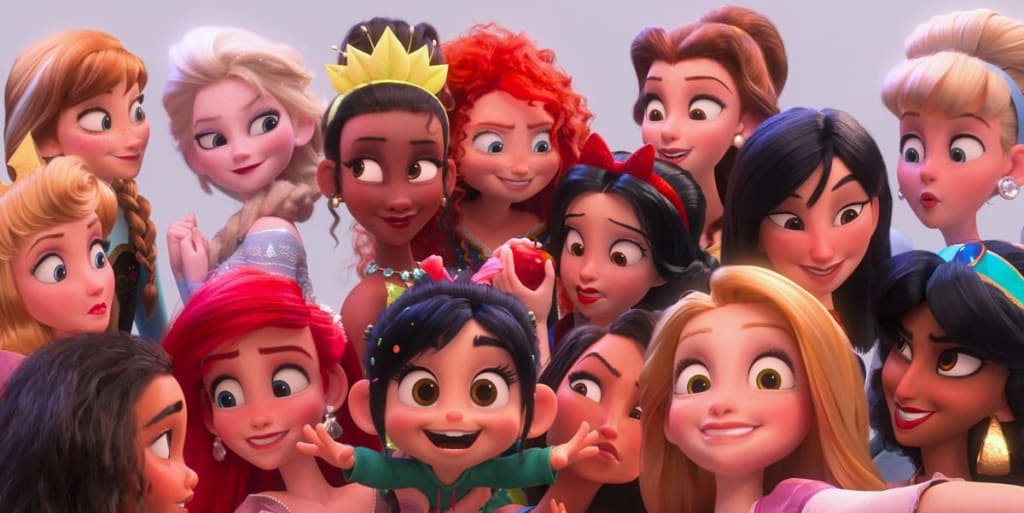
Most girls wish to become a princess when they are young, but does every girl grow up without knowing the difference between the real world and the fairy tale? Most of the family nowadays have seen some princess movies with their children, but what children learn from the movies could change what they become. We cannot deny that princess culture would not affect a child, but this culture is not detrimental to young girls because becoming someone is always a child’s dream, and children can also learn some valuable lessons from princess movies instead of just looking at the pretty dresses that they wore in the movie.
In today’s world, with the advance of technology, children can see princesses everywhere in the world. There are princess toys, restaurants, merchandises, and even theme parks. The princesses from the movie become multimillion-dollar marketing commerce. This princess culture can and will affect a child by what they see from the characters in the movies. Yet, most parents would not explain the events in the movies of what they have watched and would probably think that princess movies are just some animated movies. Some parents might even think those movies are silly and weird in some cases, but they usually forgot the good thing those princess movies have.
The first reason why the princess culture is not detrimental to young girls is that having a desire to become someone is always a children’s dream. In most of the peoples’ childhood, they all once dreamt to become someone, some might want to be their parents, some might want to be a doctor, some might want to be a basketball player, and there are some want to be a princess. Being a princess from movies becomes one of the dreams that most little girl wishes for. In the article, “In Defense of Princess Culture,” Liechty describes, “I grew up with hand-me-downs and once-a-year trips to Walmart. I’d never really been presented with a princess dress. But thinking back, if I had been, I’m pretty sure I would’ve been STOKED” (468). She said that if she has a chance to be a princess, she would be pleased to become a princess. Yet, she then explains, “Somewhere along the way, I’d come to believe princesses were a bad thing. Degrading to women; a symbol of being spoiled and superficial (thanks, Paris Hilton); a precursor to those sad little girls in beauty pageants” (468). For most human beings, as they grew older and become more knowledgeable, more intelligent, and more understandable of the real world, they will be able to comprehend the truth and ignorance even though they have once dreamt to become a princess. Discovering what a child loves to be doing is important, it does not matter if it is painting, reading, writing, playing sports, or being someone else. Therefore, parents should allow children to focus on what they are interested in and give them space and time to explore their interests.
Another reason why the princess culture is not detrimental to young girls is that princess movies are not just about pretty dresses and happily ever after. There are plenty of things that children can learn from the movies. In “In Defense of Princess Culture,” Liechty explains, “I want my daughter to understand that there are BAD people out there in the world. If someone hurts her or treats her badly, I don’t want her to try understanding where they’re coming from. I want her running in the other direction” (468). Lessons like identifying bad guys and what to do when they encounter danger can be taught and explained by the parents after watching the movies with their children, whether it is something good or something bad. Allowing them to understand that there are not always nice and happy ending in the real world like in the movies is very important. Additionally, she also mentions that she does not want her daughter to learn something falsely. She also pointed out “We don’t want our daughters learning that if you work hard and are good and sweet, you’ll find happiness” (468). She told the reader that she would not let her child misunderstand the differences between the fairy tale and the real world. All parents have the responsibility to educate their children about the differences between reality and fantasy.
Nevertheless, the reason that princess culture is detrimental to young girls is that it can lead them to become apathetic. In “The Dangers of the Princess Culture,” Alexander states, “If a parent raises a little girl to believe that she is somebody, i.e., a princess, simply because of who she is, some girl will never be motivated to be other than that. They will have no motivation to obtain an education; no motivation to perfect a skill; no motivation to improve their characters” (466). Having no motivation is just like sailing without a compass. It is very harmful to the children especially they are in a critical period of their lifetime. However, the reason why children become less motivated is mainly because of their parents allowing them to believe that they truly are a princess. Alexander also mentions, “If she truly wants to become Somebody, to distinguish herself from the millions upon millions of other should in the world, then she needs to work hard at it, and she needs to choose work that is worth doing for its own sake. She has no innate gift that makes her more, or better, and the sooner she realizes that the better a person she will become” (467). She explained that the sooner her daughter realized that she is not special and have no innate gift, the better a person she will become, which is good for parents to make their children realized that. Moreover, she also told the reader if her daughter truly wants to become someone special or someone unique, then she will have to work hard to achieve what she wanted to become. Some lessons like this can be taught by parents. Parenting is always a big impact on what kids learn from the movies. Not only princess movies, but also other movies like action movies, horror movies, crime movies, or even science fiction movies. These movies all have some sort of the same effect as the princess movies. Children could learn some violent moves or many bad things from movies. Parents should always have the responsibility to educate their children about the things that they watched and clarify to their children about the differences between the real world and in the movies.
The reasons that princess culture is not detrimental to young girls are because acting like a princess in their childhood would not change their true identity and princess movies can also learn some valuable lessons. There are lessons that the children can learn some dangerous moves or something about bad people from the movies. Parents can also teach them the importance of hard work to achieve their goals. It is all depending on how parents educate their kids from the things they have watched in the movies, not just in the princess movies, but also in many other genres of the movies. Nowadays, technology becomes extremely widespread around the world. Everyone can easily access the internet, even a 5 years-old kid. Hence, we should not be focusing on whether princess culture is detrimental to young girls or not. We should instead focus on how parents educate their children.






Comments
There are no comments for this story
Be the first to respond and start the conversation.